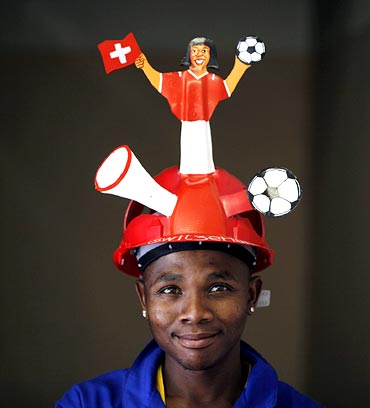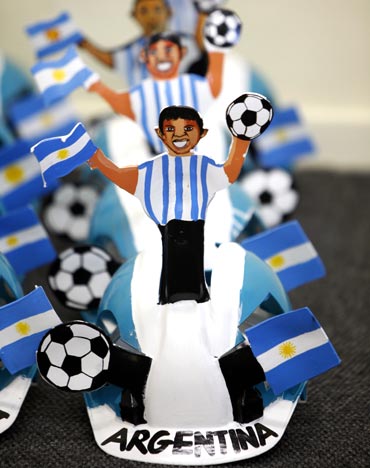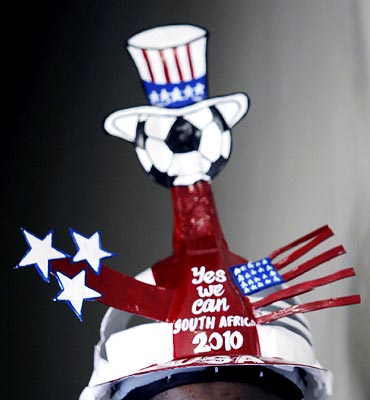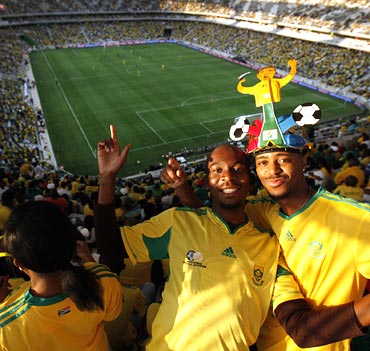The king of South Africa's makarapa fan helmet has moved from his township workshop to a factory to meet World Cup demand and expects the elaborate headgear to become a global craze after the tournament.
Dancing fans wearing the brightly painted hats made from converted plastic construction helmets, often paired with giant mock glasses, are a trademark of the South African game.
They are sure to be a major feature of Africa's first World Cup when it starts on June 11, together with the cacophonous blast of vuvuzela trumpets which may be a secret weapon against foreign teams unable to communicate through the din.
Baloyi invented the decorated helmets in 1979
Image: A worker paints a makarapa fan helmet at a factory in WyneburgFormer cleaner Alfred Baloyi, 52, invented the decorated helmets in 1979. A friend gave him a construction helmet for protection when watching his beloved Kaizer Chiefs soccer team, after a fellow fan was hit by a bottle.
Baloyi, an uneducated but talented natural artist, first starting painting the helmets, then adding horns and finally using a box knife to cut out elaborate stand-up designs.
He calls himself "the Enemy of Plastic" although his nickname from the terraces is The Magistrate.
Baloyi, originally from northern Limpopo province, started selling a few at a time beside the road but his son and manager, Lovemore, 29, says they have since sold many thousands.
Alfred now shuns journalists, leaving his son to talk to visitors, and concentrating on helmet designs.
'The makarapa was started in South Africa'
Image: The Argentina fan helmetsWith demand booming for the humble invention ahead of the World Cup, they have opened a factory in the Wynberg area of Johannesburg where Lovemore says they are producing up to 80 makarapas a day.
The Baloyis hope the exposure of makarapas during the world's most watched sporting event will turn the helmets into a global craze for international football fans.
"We are looking forward to selling in Brazil because we know they are hosting the 2014 World Cup. We are going far," Lovemore said.
"People around the world will know the makarapa was started in South Africa. Whenever there is an event in the world they must come to buy makarapas."
Around 35 people recruited from all over South Africa work in the factory, which reeks of paint. They sit round tables and are divided into teams of base painters, cutters, primer painters and artists.
The cutters heat the plastic helmets over gas burners to make them easier to mould.
The shelves of the factory are stacked with helmets for various South African companies and foreign fans, with Brazil, Germany, Spain and Italy the biggest customers.
'Our aim is to produce even beyond 2010'
Image: The US fan helmetUS helmets carry US President Barack Obama's election slogan "Yes We Can" and an Uncle Sam hat.
Most of the factory helmets are less complicated and fantastical than the "signature range" produced in Baloyi's original Germiston township workshop near Johannesburg.
Some Brazilian helmets, though, sport a stand-up figure of Rio's Christ the Redeemer statue and others have Baloyi's trademark witchdoctor on top.
Prices range from 250 rand ($32) for simple South African helmets to 1,500 for the more elaborate corporate or foreign designs.
At one table an artist is carefully painting an Italian helmet, copying a picture on the wall of the team colours.
Baloyi sits in another room with his top assistant, Jacob Letebele. He designs the helmets and together with Letebele paints samples for the other workers to cut and decorate, sometimes copying photographs of top players.
"Our aim is to produce even beyond 2010. We are going to design for South African clubs, for the Africa Cup of Nations. This is our aim to show the world, we have our art, this is from South Africa," Lovemore said.
'There is only one original makarapa in South Africa'
Image: South African football fansThe Baloyis have been unable to strike any deal with FIFA to use the tightly protected World Cup logo.
"We have to be careful about that, we could be sued. As you can see, this project is from the squatter camp. It is not from the suburbs. We are trying to make ourselves famous with the makarapa," Lovemore said.
Baloyi's success from humble beginnings has enabled him to send his daughter Calphina, 21, to art school and buy a better house for his family in Limpopo province.
However, Lovemore complains that other firms are trying to steal designs from the factory, by buying samples and producing them elsewhere, even using Alfred Baloyi's image.
"They are stabbing us in the back. That is counterfeit so for us this is a challenge. In future we are going to stop them," Lovemore said, although no legal action seems to be planned.
"There is only one original makarapa in South Africa. The founder of the makarapa is Alfred "Magistrate" Baloyi," Lovemore says with pride.







Comment
article